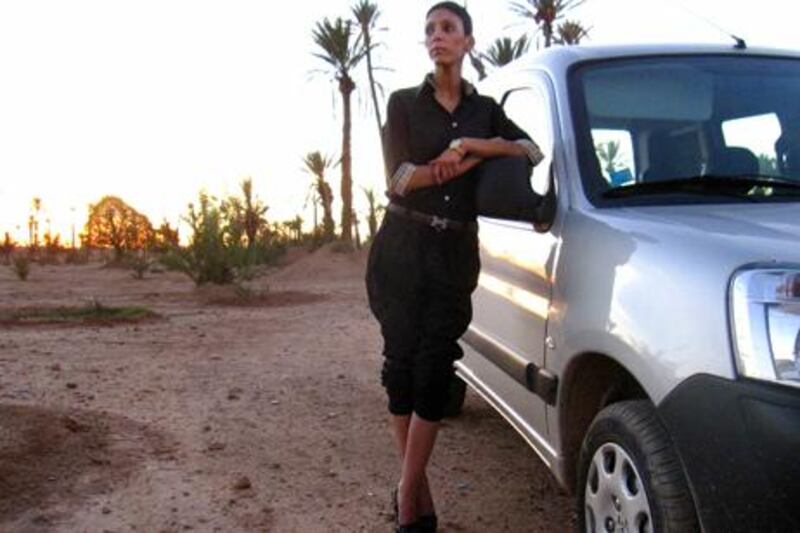MARRAKECH, MOROCCO // The sun was pouring down on the city, and Raja Bikhtancer was racing along an avenue with 220 kilograms of ice cubes in the back of her car.
"I'm not worried that they'll melt; not my ice cubes," said Ms Bikhtancer, 26, who makes ice to sell to Marrakech's restaurants and hotels. "I just like doing things quickly."
Across town, about 1,000 business leaders and officials attending a World Economic Forum conference last week were debating how Middle Eastern and North African countries struggling with high unemployment can help ambitious young people such as Ms Bikhtancer.
She is just one member of a young generation from across the region pushing to establish itself as economies shift towards the private sector.
"Many countries have highly educated people but are not benefiting from them," said Steen Lau Jorgensen, the director of the World Bank's human development section for the Middle East and North Africa, speaking by phone from Washington. "Not enough people are learning about technical fields and entrepreneurship."
While economies have grown across the Middle East and in North Africa, about a quarter of the region's young people remain unemployed.
A major problem is strict labour laws that discourage hiring, while another is that governments have spent lavishly but not strategically on education, said Mr Jorgensen. "There's a mismatch between the skills taught and the needs of the market."
One example is Algeria, where the government is investing in housing and infrastructure.
"There's a huge need for qualified engineers, top technicians and managers," said Mohamed Bahloul, the director of a private management school in the city of Oran. "Investors - national or international - have to devote a lot of time to finding the right employees."
To begin addressing this demand, the Algerian government has opened state management schools around the country, Mr Bahloul said.
Morocco, meanwhile, has sought to brighten its business climate by slashing the amount of capital required to register a company, soon to be zero.
That policy helped lure the Moroccan IT worker Younes Qassimi, 28, from Dubai back to his hometown of Agadir.
In 2007, he launched the web design company Synergie Media using 10,000 Moroccan dirhams (Dh4,550) he earned by overhauling the computers at a local bookshop.
"I could have stayed in Dubai," said Mr Qassimi. "But I wanted to prove to myself and my friends that starting from nothing, you could do something."
However, Mr Qassimi's attitude is rare despite recent education reform in Morocco, said Kristen Edgar Potter, the education department director for the Morocco office of the US Agency for International Development.
"There are opportunities in the private sector, but people need to be thinking more about them, as well as entrepreneurship opportunities," she said.
The Moroccan government has sought to encourage such thinking through the National Agency for the Promotion of Employment and Skills (Anapec), which offers job placement and support for business start-ups.
"Job placement has been successful," said Hamid Ferg, the director of Anapec's Marrakech office. "But there's a lack of entrepreneurial spirit; we're looking for people with a genuine desire to launch their own business."
Under a programme called Moukawalati - or, "My Business" - the state guarantees 85 per cent of the total capital, which comes mainly as a bank loan.
However, few proposals survive the gauntlet of approval by both Anapec and bank officers, said Mr Ferg. Of 160 applications so far this year in Marrakech, only 13 have led to businesses launching.
"We're not seeing many original ideas," said Mr Ferg. "In general, it's standard stuff like textiles and agriculture."
One exception is Ms Bikhtancer, who races through the streets of Marrakech to deliver her ice cubes.
The daughter of a Marrakech butcher, she used the Moukawalati programme in 2007 to start Karrefour Imo Consulting, an estate agency and building maintenance company catering to European expatriates.
"Then came the crisis in Europe; I couldn't just sit on my hands," said Ms Bikhtancer. "I had to go from the service sector to producing something."
Four months ago, she used profits from Karrefour Imo Consulting to buy 10 ice-cube machines.
"Top-notch machines," she said. "Ordinary ice cubes take 18 to 20 minutes to melt in a glass of Coca-Cola; mine take 35 minutes."
The buildings of Marrakech receded in the rear-view mirror as Ms Bikhtancer guided her car into the Royal Decameron Issil, a gated resort near a golf course at the edge of town.
At the back door of the kitchen, the 22 bags of ice cubes were unloaded and weighed, and their arrival was recorded in a ledger.
A moment later Ms Bikhtancer was speeding off again in her silver-grey car. "I always like to go fast," she said, whirling into a roundabout. "You can't wait for things to happen; you have to make them happen."





